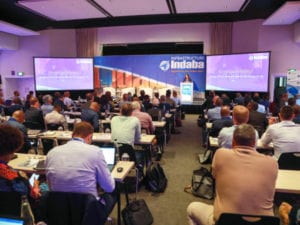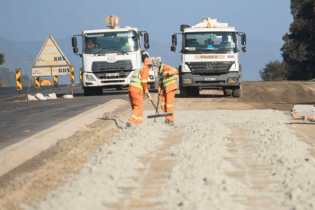In his opening remarks of the annual Infrastructure Indaba , President of Consulting Engineers South Africa (CESA), Sugen Pillay, stated that CESA wants to be part of the discussions focused on the countries renewed focus on planning for the future.
“As a country, we are going through significant changes with a renewed focus and energy on how we start planning for the future – there is a renewed sense of hope and optimism in the country”. And CESA wants to contribute and be part of the discussions focused on this renewal, Pillay stated. The annual Infrastructure Indaba took place on 11 and 12 March at the Spier Conference Centre, Stellenbosch. Urgency for action in the infrastructure industry Keynote speaker at the event, Minister of Public Works and Infrastructure, Patricia de Lille highlighted the urgency for action in the infrastructure industry. “We are a government of announcements. We need to start implementing those announcements; the patience of our people is running out.” She said government must “Khawuleza – we need to hurry up. Our country is in a bad space – if we sink, we sink together!” Minister de Lille provided a thought-provoking keynote address and even supported Pillay’s suggestion of deeper partnership between the private and public sectors. “We will take on the challenge as we try to build capacity within the DPWI. This will be key in speeding up the implementation of infrastructure delivery.” She highlighted that the delivery of much needed social infrastructure will be a priority as the department reconfigures. Following de Lille’s address, the Western Cape MEC for Transport and Public Works, Bonginkosi Madikizela, discussed the five “VIPs” (Vision Inspired Priorities) mentioned in the Western Cape budget speech last year, and the role of the infrastructure industry in contributing to:- safe and cohesive communities
- economic growth and job creation
- empowered people
- Better mobility, spatial transformation and human settlements
- innovation and culture in government
Investing in infrastructure and the Infrastructure Fund
Dr Sean Phillips addressed delegates on the Infrastructure Fund, which he runs for the DBSA with oversight by the Minister of Public Words and Infrastructure. The fund aims to increase private sector investment in public infrastructure. However, he states “the real challenge is to develop bankable and viable projects. It is also about harnessing private sector skills. The focus is on developing blended finance projects.” This is an innovative process that has been put in place by government. “A project pipeline has been set up and we are open for suggestions on possible projects,” said Dr Phillips. DBSA’s Product Development Specialist for Structured Products, Johann Lübbe, shared some of the work that is currently being done at the DBSA focused on designing programmes to prepare, finance and implement infrastructure projects in Africa through an integrated blended finance approach by mobilising funding at scale. The National Planning Commission’s Dr Miriam Altman and Dr Sean Phillips shared paper written by Dr Sean Philips and Dr Ron Watermeyer looking at public sector delivery. Dr Altman stated, “there is a shortfall in spending and a quality of spending problem in terms of the NDP. The paper focuses on a deliverable that can really make an impact: government procurement and spending of government finances.” The paper is currently out for comment. Most importantly, the paper has identified the need to separate procurement regulations for professional services from the regulations for procuring goods and services. There is a need to professionalise infrastructure procurement and to review the current PPP regulatory framework to enable better outcomes. To provide a strategic investment view of the current infrastructure industry, Investec’s Chris Holdsworth, addressed attendees. “We do not invest enough in infrastructure; however, it is not just about money. It’s about efficiency and governance.” Citing research from the World Economic Forum, he stated that governance and quality of infrastructure is linked. To see growth in South Africa, Holdsworth stated that we have to see an increased ability to spend on infrastructure, improvement in governance, and a shift to investing in maintenance rather than just capex. Public Sector Procurement in the Construction Sector In the Public Sector Procurement in the Construction Sector session, Auditor-General Thembekile Kimi Makwetu talked about the Auditor-General’s overarching responsibility to not only report on how money was spent, but also keep the public informed through performance audits on the assets acquired. He stated that they have found serious shortcomings during the audit including the lack of maintenance of infrastructure, including underspending, as well as serious lack of planning for infrastructure development. “I challenge the conference to look at the assets that we already have, and to see how they can be better utilised. I welcome CESA’s strategic direction recommendations focused on maintaining standards of professionalism and quality management. The Auditor-General is ready to work with CESA!” Randall Cable, Regional Manager from South African National Roads Agency Limited (SANRAL) presented the organisation’s infrastructure investment plans. Phiwengesihle Mashabane from the Chief Procurement Office who currently looks after infrastructure procurement in National Treasury, said it is very clear that the infrastructure space is taking shape to allow National Treasury to focus on its core function. She added that Treasury has welcomed the opportunity to contribute to the development of the new Public Procurement Bill. Construction Industry Development Board (cidb)’s Ishmail Cassiem discussed the cidb’s strategic objectives, and their consideration for developing the register of professional service providers including the creation a client recognition scheme.






